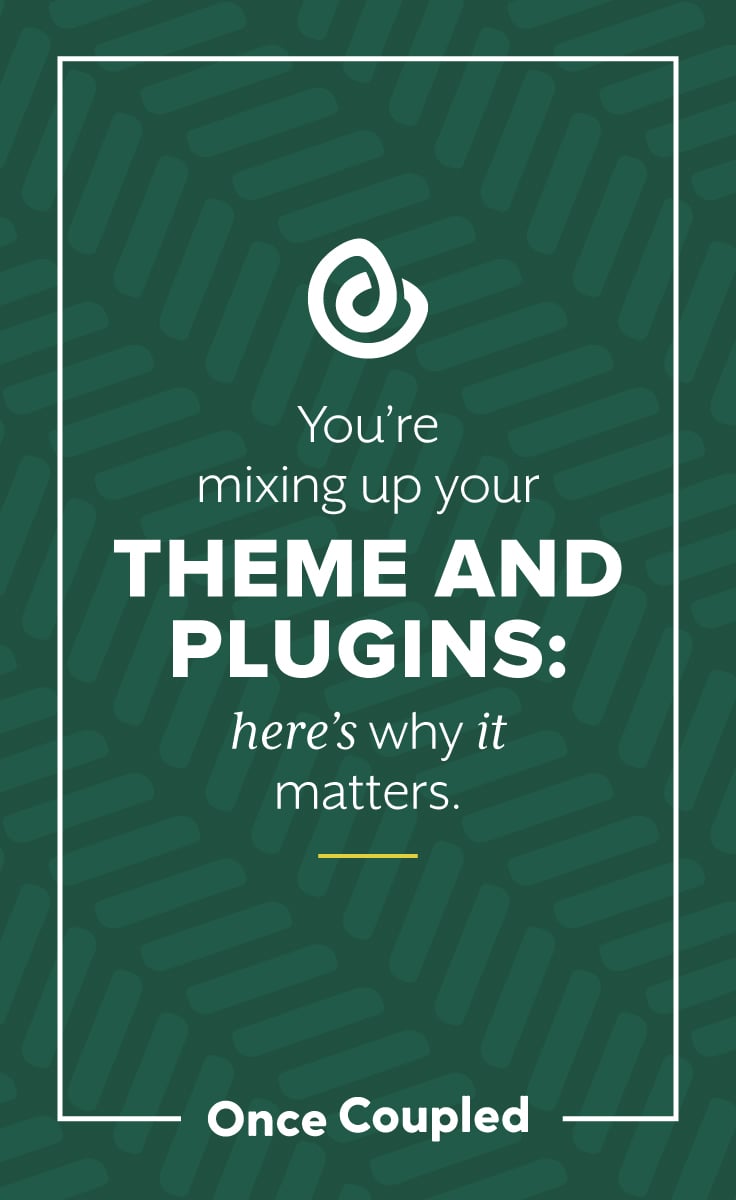Yes, it matters if you’re using themes and plugins correctly. Maybe not right now, but when you realize it matters, you’ll probably feel pretty frustrated that nobody told you that earlier. So let’s talk about it.
What’s the difference between a theme and a plugin?
Themes and plugins can feel interchangeable: we can use either to output (and often change the display of) content on our sites, after all. But the difference is in the details.
Themes display and style your posts. They’re responsible for the front-end of your site, or what your readers see and interact with. You can only have one theme active at a time.
Plugins help manage your content. They add to the functionality of the back-end of your site, which is how your posts are stored, related, and otherwise manipulated. You can activate many plugins at the same time.
When should I use a theme?
If content is being visually manipulated, the way in which it’s laid out and the fonts & colors that are applied to it are (primarily) managed by your theme.
When you want to change how your site looks or add a new section of content (which already exists in WordPress), update your theme.
Examples:
- A custom home page template
- The way a specific widget or plugin looks
- Updating your brand, including changing the logo, fonts, & colors
When should I use a plugin?
If content is being created, deleted, or changed, it’s (primarily) managed by your plugins unless it’s part of WordPress’s core functionality.
If you want to add a feature to your site, one that should last beyond the life-expectancy of your theme, install a plugin.
Examples:
- Custom post types, like recipe cards
- Comment reply notifications via email
- Related posts (particularly when manually assigned – you don’t want to have to re-do that every time you switch themes)
Is there such a thing as too many plugins?
The reason many clients want their theme to do the heavy lifting and many developers feel the need to publish a single, giant plugin is because of the “too many plugins” myth.
Yes, I said myth. “Too many plugins” isn’t really the issue, it’s that a single bad plugin can open your site to security threats or add an abundance of resources to every page load. Using more plugins in general simply increases your chances that you run into one of these bad plugins.
More plugins, more problems
That said, there is reason behind the recommendation to slim down your plugins.
More plugins can also be harder to manage, especially if you’re not technically-inclined. They make more work because you need to keep everything up to date and periodically go through each to see if it’s time to replace them. They can make maintaining functionality harder long-term since there are so many moving parts to keep in sync.
Plugins aren’t inherently bad, though. Once Coupled has 64 active plugins, at the time of writing this article. (We usually see around 12 for a new blogger, 24 for a long-time blogger, and much higher amounts for membership or e-commerce sites).
If you have a lot of plugins installed and you’re not using each and every one, it’s time to go through them and clean house.
What happens if I use a theme or a plugin incorrectly?
If a theme is adding functionality to your site, it’s going to be difficult to move away from that theme in the future. This is particularly true with themes that build in recipe functionality (e.g. the Recipe theme) or have page builders (e.g. the Divi theme). The more you use these features, the more you’ll have to update when switching to your next theme. That’s true to an extent with any custom theme, but I’m talking about having to re-format every post on your site or losing every recipe when you switch themes. That is a particularly un-fun nightmare.
The good news is that it’s hard to use a plugin incorrectly. They’re meant to be modular, so they’re easy to add and remove. For most plugins, though, the simpler they are, the better. Since plugins are meant to work on ANY site, they can easily become bogged down in unnecessary options, features, styles – you name it. When poorly managed, this will lead to a “bad” plugin.
How can I evaluate my current plugins?
Once Coupled regularly performs plugin audits for clients, analyzing all of the currently installed plugins, evaluating whether they’re actively used, determining if they need to be replaced, and summarizing how they should be handled moving forward.
Part of that comes from our experience auditing site speed, part from our experience developing custom themes, and part simply from working in hundreds of client sites over the years.
It’s possible to self-audit your plugins, though, and we’re going to show you how but sharing all of our experience with you. For more on auditing and evaluating your plugins, see our post on the Mediavine blog!
Not interested in DIYing? Want to get a head start on auditing your plugins? Contact Once Coupled.




Leave a Reply